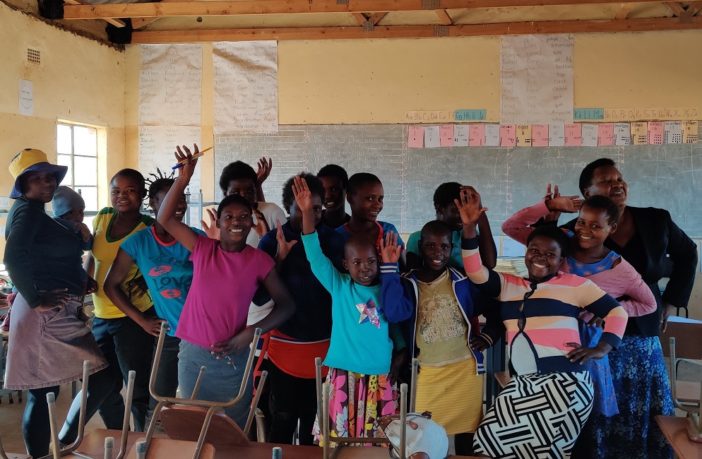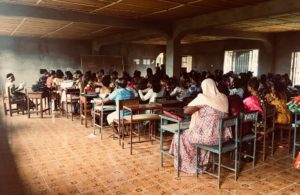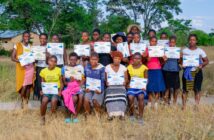International Women’s Day (8 March) is a chance for us to celebrate, support and champion the work of women from across the world. With this year’s theme of ‘an equal world is an enabled world’, it’s a perfect opportunity to highlight the fantastic women-led projects of The Open University’s International Development Office.
Celebrating its 20th anniversary this year, the International Development Office (IDO) partners with governments, NGOs and funding institutions to deliver innovative and scalable projects, improving the lives of over two million people from some of the most deprived regions of the world. Using the OU’s academic experts and leading technology in the delivery of open and distance education, the IDO team works towards multiple Sustainable Development Goals, as set out by the United Nations.
Access to good health; quality education; gender equality and clean water and sanitation are fundamental human rights. Three projects, supported by UK Aid through the Girls’ Education Challenge, IGATE-T, SAGE and GATE-GEC support these global goals, and are just a handful of the great work the IDO are doing to change lives of women and girls globally and achieve social justice.
IGATE-T
Improving Gender Attitudes, Transition and Education Outcomes (IGATE-T), sets out to advance the life chances of 73,000 marginalised girls across nine districts of Zimbabwe. With less than half of girls from the poorest quintile who attend primary school transitioning to secondary school, IGATE-T supports their learning and helps them go beyond primary education. By supporting the development of foundational literacy and numeracy, financial literacy and life skills, the girls leave the programme better equipped to build secure livelihoods.
Funders and partners include UK AID, World Vision, Care, SNV Smart Development Works, Emthonjeni Women’s Forum and UDACIZA (Union for the Development of the Apostolic and Zionist Churches in Zimbabwe Africa).
An IGATE-T learner said: “When I started IGATE-T, I couldn’t read or write, I’ve come a long way, and my English is much better…. I now know that I can do it and I want to be an English teacher when I grow up.”
Another IGATE learner commented: “I hope to give my son better opportunities than I was afforded and am realizing the potential to make something of myself.”
SAGE – Supporting Adolescent Girls’ Education
Supporting Adolescent Girls’ Education (SAGE) provides the most marginalised girls from 11 of the poorest districts in Zimbabwe, with an accelerated learning programme to help them ‘catch up’ their education. 132 community-based Learning Hubs throughout the country support more than 21,000 girls aged 10-19 to gain basic literacy and numeracy skills. The study material, which has been co-developed by the OU and a consortium of partners, is designed to be accessible and relevant to the lives and interests of the girls, with additional support for those with disabilities.
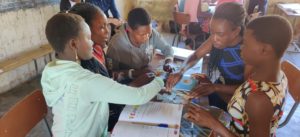
SAGE is designed for girls who have never been enrolled in school or have dropped out before completing their basic education. Many have vulnerabilities and are from single-parent households, are orphans living with extended family, are at risk of early marriage, or are engaged in child labour. The Learning Hubs provide a safe and inclusive learning space, where education is accessible, and doors are opened to other opportunities. Learning activities also complement a life skills programme in which girls act as ‘Champions of Girls Education’ to work with communities including men, boys and local leaders to adopt more positive gender attitudes and mobilize them to support and protect girls.
Partners include Plan International, CBM UK, Apostolic Women’s Empowerment Trust (AWET) and Econet Wireless.
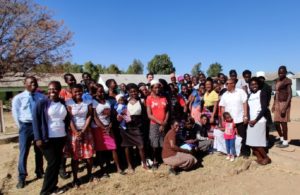
Caroline Dean, Programme Manager at Plan UK for the SAGE programme commented: “From challenging life experiences and barriers, SAGE girls are emerging with their inextinguishable determination, enthusiasm and passion, to learn and succeed. They see the SAGE programme as an opportunity to gain the skills and attitudes they need to lead successful lives, for themselves and for their families, children and communities. They are not only learners but future leaders, who will mobilise positive change across Zimbabwe.
GATE-GEC – Girls’ Access to Education
The lack of female teachers in Sierra Leone makes it hard for girls to aspire to a career of their own. Only 27% of girls are still enrolled in school by secondary level. The Girls’ Access to Education (GATE-GEC) programme, works with rural communities, to support young women who have been unable to complete secondary schooling to become learning assistants and to qualify as teachers. The girls undertake a practical work placement in a local primary school at the same time as studying a distance learning programme to become qualified teachers.
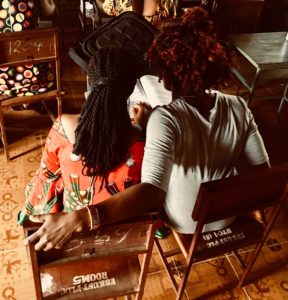
The programme has supported over 500 women to become learning assistants, with 476 completing their studies at the Teachers’ Colleges to become fully qualified teachers. A further 250 girls started the programme in 2017 and are due to complete their studies soon. Learning assistants have been shown to make a difference to the quality of rural schools and the learning experiences of children, acting as role models to the girls with many aspiring to follow in their footsteps.
Funders and partners include UK Aid, Plan International, Humanity and Inclusion, Forum for African Women Educationalists in Sierra Leone (FAWE) and ActionAid.
One of the students said: “Before [GATE_GEC], it was very much evident that I had no future hope, but today I strongly believe I am better placed both within and outside my community. It has created tremendous change in my life.”
Kimberly Safford, Senior Lecturer in Education Studies at the OU and Academic Lead for GATE-GEC commented: “Women teachers make a difference in schools and in communities. We are proud of our learning assistants and student teachers in Sierra Leone. They inspire girls to participate and achieve – and are role models of resilience and determination to learn and succeed.”
Aloysius Kamara, FAWE Project Manager added: “Our Learning Assistants/Student Teachers presence in rural primary schools has not only addressed teacher shortages, but through their mentoring services has contributed to the retention of girls in rural primary schools in Sierra Leone. Female students have access to persons they can confide in and share personal issues.”
